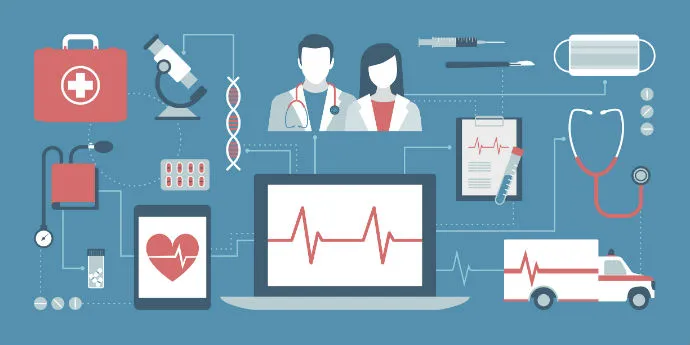

How Technology Is Reshaping The Healthcare Industry
Technology Is Reshaping The Healthcare Industry
Healthcare industry is currently experiencing a massive digital transformation. There has been stable progress since the introduction of technology in this sector. Tech components like Machine Learning, Natural Language Processing (NLP), cloud computing, Artificial Intelligence and Internet of Thing have helped in streamlining the health care delivery and treating severe diseases.
How Technology Impacts The Healthcare Industry
By using technology in medical center, the sector is advancing and progressing in ways no one have ever though-about. As patients began to wary due to unavailability of doctors, poor quality of patient care and issues with finding reasonable care, technology stepped in and a new way to find the help was introduced- Virtual Care. Around 23% of patients had consulted the virtual doctors and satisfied with the care. Moreover, 57% of patients are willing to experience it as well. That's how technology is bringing convenience and ease in the sector.

The contribution of technology in the industry is awe-inspiring. Google DeepMind's network has diagnosed around 50 sight-threatening eye diseases with greater accuracy as compared to that of a professional. On the other hand, pharma companies are using technology to create more effective drugs and medicines for the patients.
Role of Artificial Intelligence In The Healthcare Industry
According to the statistics, the AI healthcare market is set to generate annual growth of 40% by the year 2021. It will improve the outcomes by 40% and cut the treatment cost in half. Among its several contributions, some of them include analytics prediction, equipment maintenance, safety control measures, and data insights.
It is revolutionizing the industry moving its horizon to the next level of perfection and accuracy. The superhuman intelligence of AI is enabling to develop robots that can operate and indulge in complex medical treatments. According to Harvard Business Review, with the help of AI orthopedic surgeries around 40% increment in annual saving is calculated.
Role of Machine Learning In The Healthcare Industry
Unleashing endless opportunities in the healthcare industry, machine learning provides administrative assistance to hospitals. It streamlines processes, maps the treatments, and assists in eradicating the disease. Moreover, it personalizes medical treatments.
Machine learning is the subset of AI, which is referred to as the "future of healthcare,” by Fatima Paruk. Furthermore, Machine learning helps in keeping smart medical records. Integrating the technology, Quotient Health developed a smart software that ensures to reduce cost of supporting the EMR system.
In addition, ML helps in medical imaging and diagnostics. The famous PathAI’s is employing ML to help the pathologists identify accurate diagnoses, which can satisfy their patients. Lastly, machine learning assists in drug discovery, development, and storing medical data.
Role of Internet-of-Thing In The Healthcare Industry
As the population rises, the number of deadly diseases too maximizes creating a need for better medical solutions. Internet of thing has become one of the most beneficial paradigms of technology to open better avenues of creating improvisation in the sector. According to the report submitted by MarketResearch.com, the IoT healthcare sector is expected to hit $117 billion by 2020.

You can monitor records in real-time. Moreover, with efficient monitoring, you can be attentive during severe medical situations like a heart attack. Diabetes and heart failure.
Moreover. IoT facilitates end-to-end connectivity. Using healthcare mobility solution, it can automate a patient’s care workflow. It facilitates smart machine-to-machine communication, interoperability, along with data and information exchange making the delivery effective.
Furthermore, IoT helps in data assortment and effective analysis. It can process a vast amount of data flawlessly in a short period. Data recovery and protection are among its many benefits. Lastly, you can keep track of your progress and get alerts as your health shows any serious signs.
The Future Of Technology In The Medical Industry
As per the statistics, healthcare is an attractive market for startups and giant tech-related corporate entities as it accounts for 18% of the US economy. Many companies have already made sufficient investment and contribution to the sector. Apple created its product the famous Apple Watch that can read the pulse, send emergency messages, and calls if you fall and keep a track of your health. Countless patients reported having a better and convenient healthcare experience by concerning the healthcare startups.
Considering the promising development in the industry, many new advancements are set to arrive in the next decade. According to the 2018 survey, 57% of the healthcare professionals by intel Corporation believe that AI adoption will become epidemic in the next five years.Better cloud integration, smart therapies, and effective personalized medical care are among the few innovations expected to arrive.
Conclusion
Though its undeniable fact that technology is uncovering astonishing developments and possibilities in the healthcare sector, one can't ignore the adverse capabilities it possesses. Therefore, rules and regulation should be made to limit the use of technology and to create a sense of evaluation to judge how effective the solution will be. Professionals would be guided about the limitations involved in using AI or machine learning and what will happen if one thing goes wrong. As you know with every pros, a con follows so why not stay safe and conscious to avoid the consequences.





